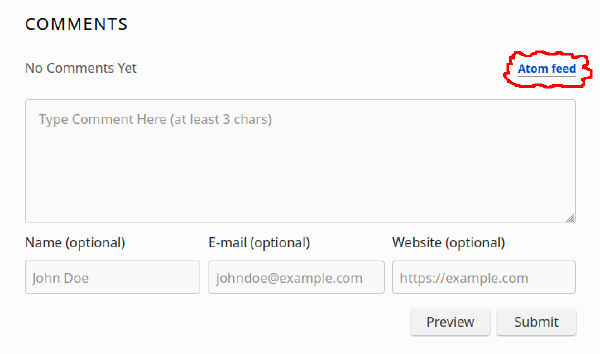The threat of to search says more about search than it does about AI.

Another wandering soul whispering into the void. If you are looking for my blog you are in the wrong place. The profile and header pictures are brought to you by cdd20.

Another wandering soul whispering into the void. If you are looking for my blog you are in the wrong place. The profile and header pictures are brought to you by cdd20.
My static micro blog experiment is going better than expected. Generation is
still around 25 seconds hot on my old laptop as like the last time.
Well… sneakily it’s closer to a semi–constant 5~10 seconds by tricking
hugo into outputting empty
base templates
which “can” result in mostly reads by writing files that have changed (might
make a blog post about this).
This blog becomes mostly complete (minus the sharp edges) when there’s an archiving strategy on the paginator — basically a ghetto queue.
$ hugo
| EN
-------------------+-------
Pages | 1728
Paginator pages | 662
Non-page files | 13
Static files | 430
Processed images | 572
Aliases | 76
Sitemaps | 1
Cleaned | 0
Total in 26010 ms
Another wandering soul whispering into the void. If you are looking for my blog you are in the wrong place. The profile and header pictures are brought to you by cdd20.
The Enhance Framework looks compelling. Personally, web components and more particularly the shadow DOM are not very appealing but… the template structure looks clean for drawing up components/layouts super fast while still being primitive enough to not lose transposability between different environments.
It seems like there’s an uptick in discussions online around web components but maybe that’s just the typical developer marketing/advocating. Web components have been around for a bit.

Another wandering soul whispering into the void. If you are looking for my blog you are in the wrong place. The profile and header pictures are brought to you by cdd20.
Writing assistant: Vale. I heard somewhere that writing/speaking at a 6th grade level is a surefire way to be relevant… whoops.
$ vale extensible-stylesheets.md
1:1 suggestion Grade Level 11.02. thedro.Readability
16:3 error Use code tag `XML` instead of technical.CodeSubtitutions
'XML'. 
Another wandering soul whispering into the void. If you are looking for my blog you are in the wrong place. The profile and header pictures are brought to you by cdd20.
Look at this Makefile — then look at this NixOS package derivation. Appears simple but I couldn’t for the life of me divine how to quickly compile a custom/patched kernel module on NixOS. Abstractions… are very magical. The guide is cool and all, but it’s a better time investment to guesstimate the relationship between the higher/lower layer. This friendly example looks more like this in reality though ;-)

Another wandering soul whispering into the void. If you are looking for my blog you are in the wrong place. The profile and header pictures are brought to you by cdd20.
A NixOS configuration for a working sound driver on an A1418 Cirrus Logic CS8409/CS42L83.
{ stdenv, lib, fetchgit, linuxKernel, kernel ? linuxKernel.kernels.linux_5_15
, version ? "d0d785dc1859b09299bde6d0f1d6786a0d610e7f" }:
stdenv.mkDerivation {
inherit version;
name = "sna-hda-codec-cs8409-${version}-module-${kernel.modDirVersion}";
# Upstream: https://github.com/davidjo/snd_hda_macbookpro
src = fetchgit {
url = "https://github.com/egorenar/snd-hda-codec-cs8409.git";
rev = version;
sha256 = "sha256-0UeoERcYpM+ojeZ7dDIE3ruTIoHkkC+s7FcoEVUTR0w=";
};
hardeningDisable = [ "pic" ];
nativeBuildInputs = kernel.moduleBuildDependencies;
NIX_CFLAGS_COMPILE = [ "-g" "-Wall" "-Wno-unused-variable" "-Wno-unused-function" ];
makeFlags = kernel.makeFlags ++ [
"INSTALL_MOD_PATH=$(out)"
"KERNELRELEASE=${kernel.modDirVersion}"
"KERNEL_DIR=${kernel.dev}/lib/modules/${kernel.modDirVersion}/build"
];
postPatch = ''
printf '
snd-hda-codec-cs8409-objs := patch_cs8409.o patch_cs8409-tables.o
obj-$(CONFIG_SND_HDA_CODEC_CS8409) += snd-hda-codec-cs8409.o
KBUILD_EXTRA_CFLAGS = "-DAPPLE_PINSENSE_FIXUP -DAPPLE_CODECS -DCONFIG_SND_HDA_RECONFIG=1"
KERNELRELEASE ?= $(shell uname -r)
KERNEL_DIR ?= /lib/modules/$(KERNELRELEASE)/build
PWD := $(shell pwd)
default:
make -C $(KERNEL_DIR) M=$(PWD) CFLAGS_MODULE=$(KBUILD_EXTRA_CFLAGS)
install:
make -C $(KERNEL_DIR) M=$(PWD) modules_install
' \
> Makefile
sed --in-place 's|<sound/cs42l42.h>|"${linuxKernel.kernels.linux_6_0.dev}/lib/modules/${linuxKernel.kernels.linux_6_0.modDirVersion}/source/include/sound/cs42l42.h"|' patch_cs8409.h
sed --in-place 's|hda_local.h|${kernel.dev}/lib/modules/${kernel.modDirVersion}/source/sound/pci/hda/hda_local.h|' patch_cs8409.h
sed --in-place 's|hda_jack.h|${kernel.dev}/lib/modules/${kernel.modDirVersion}/source/sound/pci/hda/hda_jack.h|' patch_cs8409.h
sed --in-place 's|hda_generic.h|${kernel.dev}/lib/modules/${kernel.modDirVersion}/source/sound/pci/hda/hda_generic.h|' patch_cs8409.h
sed --in-place 's|hda_auto_parser.h|${kernel.dev}/lib/modules/${kernel.modDirVersion}/source/sound/pci/hda/hda_auto_parser.h|' patch_cs8409.h
'';
meta = { platforms = lib.platforms.linux; };
}Then build it as a extra/custom kernel module. The results of stumbling upon yet another troublesome device…
{ pkgs, ... }:
{
boot = {
extraModulePackages = [
(pkgs.callPackage ../packages/snd-hda-cs8409/default.nix {
kernel = pkgs.linux_5_15;
})
];
};
}
Another wandering soul whispering into the void. If you are looking for my blog you are in the wrong place. The profile and header pictures are brought to you by cdd20.
Bots are ≈ 80% noise. It’s funny that in general analytics are not needed anymore. 80% noise and 20% signal. 80:20. It’s safe to turn off the computer and head outside — you’re not missing much when not on the Internet (it’s smaller than you’d think signal–wise).

Another wandering soul whispering into the void. If you are looking for my blog you are in the wrong place. The profile and header pictures are brought to you by cdd20.
I had some time to futz about updating my Isso setup and forgot that a while back they added Atom Feeds. It’s also neat that it uses Atom Threading (an example). Installation from source is easier too.

Index: Cache · Source

Another wandering soul whispering into the void. If you are looking for my blog you are in the wrong place. The profile and header pictures are brought to you by cdd20.
My default nix configuration on NixOS.
This configuration is more for building/debugging stuff and caching with
nix-serve.
Usually my package version is locked since different
versions of
nix can have some effects.
{ config, ... }:
{
nix = {
package = (import ../versions.nix).nix_2_17 { inherit config; };
settings = {
log-lines = 25; # https://nixos.org/manual/nix/unstable/command-ref/conf-file.html#conf-log-lines
fallback = true; # https://nixos.org/manual/nix/unstable/command-ref/conf-file.html#conf-fallback
tarball-ttl = 0; # https://nixos.org/manual/nix/unstable/command-ref/conf-file.html#conf-tarball-ttl
show-trace = true; # https://nixos.org/manual/nix/unstable/command-ref/conf-file.html#conf-show-trace
connect-timeout = 5; # https://nixos.org/manual/nix/unstable/command-ref/conf-file.html#conf-connect-timeout
auto-optimise-store = true; # https://nixos.org/manual/nix/unstable/command-ref/conf-file.html#conf-auto-optimise-store
narinfo-cache-negative-ttl = 0; # https://nixos.org/manual/nix/unstable/command-ref/conf-file.html#conf-narinfo-cache-negative-ttl
narinfo-cache-positive-ttl = 0; # https://nixos.org/manual/nix/unstable/command-ref/conf-file.html#conf-narinfo-cache-positive-ttl
builders-use-substitutes = true; # https://nixos.org/manual/nix/unstable/command-ref/conf-file.html#conf-builders-use-substitutes
min-free = 268435456; # https://nixos.org/manual/nix/unstable/command-ref/conf-file.html#conf-min-free (256 MB in Bytes)
max-free = 1073741824; # https://nixos.org/manual/nix/unstable/command-ref/conf-file.html#conf-max-free (1 GB in Bytes)
allowed-users = [ "root" "@wheel" ]; # https://nixos.org/manual/nix/unstable/command-ref/conf-file.html#conf-allowed-users
trusted-users = [ "root" "@wheel" ]; # https://nixos.org/manual/nix/unstable/command-ref/conf-file.html#conf-trusted-users
experimental-features = "nix-command flakes"; # https://nixos.org/manual/nix/unstable/command-ref/conf-file.html#conf-experimental-features
};
};
}
Another wandering soul whispering into the void. If you are looking for my blog you are in the wrong place. The profile and header pictures are brought to you by cdd20.
I thought about posting notes on Syncthing but then I’d have to tangentially talk about NixOS. NixOS is my main Linux distribution but Nix/NixOS/Flakes are too hard to write about and I fear they’ve ventured too far into the realm of over–engineering.
What do I mean by over–engineering? An over–engineered tool is one where even the simplest use cases are non–obvious (to most people) and this can happen when it tries to do too many things with “specificity”. The overall concept is elegant though (explainable in lay terms) and can be applied in other contexts.
